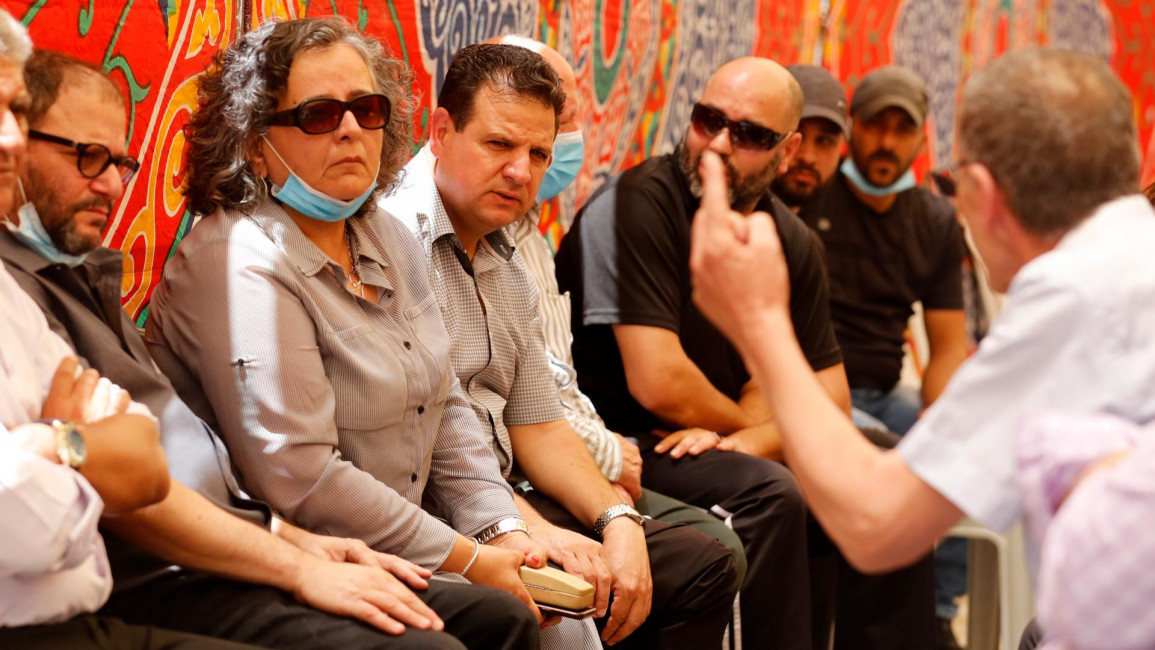Israel suspends parliament sessions after Palestinian lawmaker contracts coronavirus
Israel suspends parliament sessions after Palestinian lawmaker contracts coronavirus
Israel's Knesset has shut after Palestinian-Israeli lawmaker Sami Abou Shahadeh tested positive for the novel coronavirus.
3 min read
Politicians from the Arab Joint List visited the mourning tent for Iyad Hallak [AFP/Getty]
Israel closed its parliament on Thursday and suspended all upcoming sessions after a Palestinian parliamentarian tested posted for the novel coronavirus, Reuters reported.
Lawmaker Sami Abou Shahadeh, a member of the Arab Joint List alliance representing the Balad Party, tested positive for the novel coronavirus.
Israel's parliament, known as the Knesset, announced that non-essential staff had been asked to stay home. All of Thursday's committee meetings were also postponed.
The measures are "pending an investigation of the ramifications" of lawmaker Abou Shahadeh testing positive for coronavirus. Abou Shahadeh entered quarantine two days after his driver tested positive, The Times of Israel reported.
"I appeal to all of those who have been in my immediate vicinity to self-isolate and get tested," Abou Shahadeh said on Twitter.
"The virus is still among us and a return to so-called routine helps the virus spread with greater magnitude and speed."
In Israel's most recent parliamentary election, the Joint List won a record 15 seats.
Abou Shahadeh told Israel's Kan public broadcaster that he had been in contact with thousands of people.
"I went to comfort mourners and also to family events and demonstrations. I was on committees, in the plenary and even the cafeteria," he said.
The Palestinian lawmaker visited the mourning tent of autistic Palestinian man Iyad el-Hallak who was shot dead on the weekend by Israeli officers in Jerusalem's Old City, Walla news site reported.
Read more: Israel police kill Palestinian they mistakenly thought was armed
Israel has gradually relaxed its anti-coronavirus measures in recent weeks, reopening schools, beaches and restaurants.
The country has registered 291 deaths from COVID-19 and more than 17,400 cases in a population of around nine million, according to official figures.
But despite Israel faring relatively well compared to some countries, the government is already preparing for a spike in cases that could hit this winter or even sooner.
There are concerns that children could transmit coronavirus as schools reopen in the country.
Forty-two schools had closed as of Thursday over fresh outbreaks of the virus, Reuters reported.
Israel has launched a campaign to test 100,000 people for novel coronavirus antibodies as the country prepares for a possible "second wave" of cases, a top official said last week.
The initiative is one of the world's largest such schemes and aims to test Israel's "collective immunity" against the COVID-19 disease.
In parallel to the national campaign, authorities are also running separate surveys of "high-risk areas".
Lawmaker Sami Abou Shahadeh, a member of the Arab Joint List alliance representing the Balad Party, tested positive for the novel coronavirus.
Israel's parliament, known as the Knesset, announced that non-essential staff had been asked to stay home. All of Thursday's committee meetings were also postponed.
The measures are "pending an investigation of the ramifications" of lawmaker Abou Shahadeh testing positive for coronavirus. Abou Shahadeh entered quarantine two days after his driver tested positive, The Times of Israel reported.
"I appeal to all of those who have been in my immediate vicinity to self-isolate and get tested," Abou Shahadeh said on Twitter.
"The virus is still among us and a return to so-called routine helps the virus spread with greater magnitude and speed."
In Israel's most recent parliamentary election, the Joint List won a record 15 seats.
Abou Shahadeh told Israel's Kan public broadcaster that he had been in contact with thousands of people.
"I went to comfort mourners and also to family events and demonstrations. I was on committees, in the plenary and even the cafeteria," he said.
|
Read more: Israel police kill Palestinian they mistakenly thought was armed
Israel has gradually relaxed its anti-coronavirus measures in recent weeks, reopening schools, beaches and restaurants.
The country has registered 291 deaths from COVID-19 and more than 17,400 cases in a population of around nine million, according to official figures.
But despite Israel faring relatively well compared to some countries, the government is already preparing for a spike in cases that could hit this winter or even sooner.
There are concerns that children could transmit coronavirus as schools reopen in the country.
Forty-two schools had closed as of Thursday over fresh outbreaks of the virus, Reuters reported.
Israel has launched a campaign to test 100,000 people for novel coronavirus antibodies as the country prepares for a possible "second wave" of cases, a top official said last week.
The initiative is one of the world's largest such schemes and aims to test Israel's "collective immunity" against the COVID-19 disease.
In parallel to the national campaign, authorities are also running separate surveys of "high-risk areas".
Read more: Thousands of Israel schoolchildren and teachers quarantined following new coronavirus outbreak
Israel's ultra-Orthodox Jewish community has been particularly hard-hit by the pandemic, while other focus groups include hospital staff treating coronavirus patients.
The government has bought around 2.5 million tests for the antibodies scheme, said Yair Schindel, a senior official on the government's task force tackling the pandemic.
Israel enforced strict measures at the start of the pandemic, shutting its borders to visitors and ordering residents to stay at home.
Agencies contributed to this report.
Follow us on Facebook, Twitter and Instagram to stay connected



